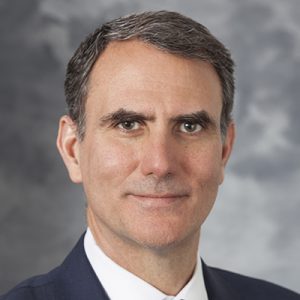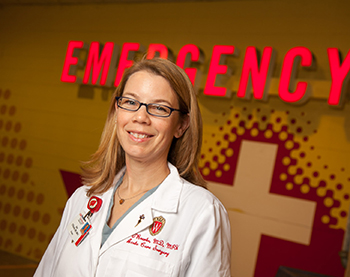Our acute care surgery faculty provide expertise in burn and wound treatment, trauma, surgical critical care, surgical nutrition, and emergency general surgery across UW Health, including at our American College of Surgeons designated Level I adult and pediatric trauma centers. All of our acute care faculty are certified by the American Board of Surgery.
Our board-certified regional general surgeons provide comprehensive general surgery care close to home for our patients, including at UnityPoint Health-Meriter Hospital in Madison and SwedishAmerican Health System in Rockford, Illinois.
In addition to patient care, the Division pursues a diverse portfolio of research projects and trains the next generation of surgeons in both the general surgery residency and in a surgical critical care fellowship.
Surgical Critical Care Fellowship
Education of a surgical critical care fellow requires graduated responsibility for decision making in patient care. The goal of our program is to maximize the educational experience for our fellows while maintaining a focus on patient safety and quality patient care. The attending faculty member, who is ultimately responsible for the overall care of the patient, monitors this progressive independence in our fellows. As fellows progress throughout the program they are allowed increasing independent responsibility for carrying out their own patient management decisions, with indirect supervision and oversight.
Our patient census includes a large variety of patients from all walks of surgical practice. Our trauma service admits more than 3,500 patients annually including 800 to the SICU. Our transplant service performs more than 500 solid organ cases annually, more than 100 of whom are managed acutely by the surgical intensivists. In addition, our busy emergency general surgery, surgical oncology, vascular surgery, and otolaryngology services regularly admit cases for ICU management. Time on the Cardiothoracic ICU service, Neurocritical Care service, and Pulmonary Critical Care service supplement the experience. Elective time may be spent learning about any area of critical care practice, including anesthesiology, infectious diseases, nephrology, surgical nutrition support, echocardiography and burn surgery. All fellows receive formal training in critical care ultrasound. Most experiences may be obtained at the University of Wisconsin Hospital and Clinics. In addition, our numerous collaborations with other institutions allow for elective experiences elsewhere, if desired.
The Surgical Critical Care Fellow learns from our staff of seven faculty members in the Section of Trauma and Acute Care Surgery. The Department of Surgery has also forged a relationship with the Departments of Anesthesia and Internal Medicine, for a collaborative, comprehensive fellow learning experience. Educational experiences are supplemented by monthly journal clubs and ICU mortality and morbidity conferences, weekly ICU fellow conferences, and several research collaborative meetings.
Our Section of Trauma and Acute Care Surgery consists of seven full-time faculty members with more than 60 years of teaching experience in this specialty. The clinical time on surgical critical care may be supplemented with an additional year of academic development and acute care surgery: working with our faculty to better prepare for a career in academic surgery. Our faculty has copious experience in basic and clinical sciences and, in particular, in Health Services Research. This supplemental experience may culminate in a Masters in Science or Certificate degree through the University of Wisconsin-Madison, as per candidate needs.


